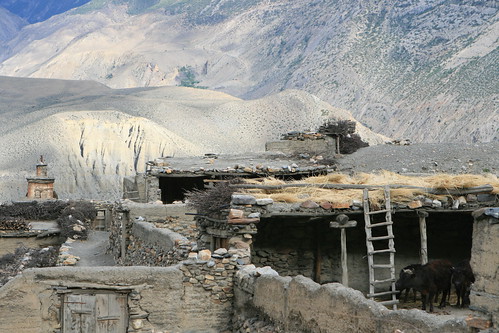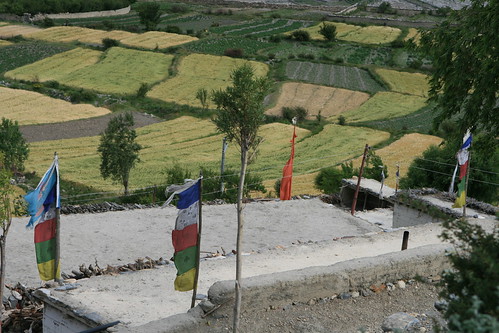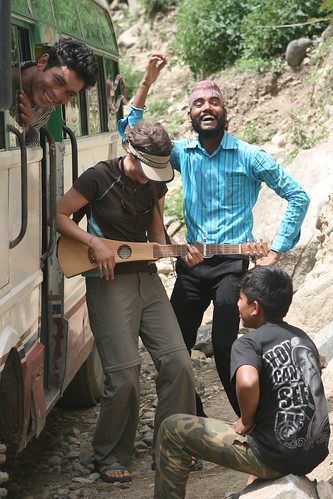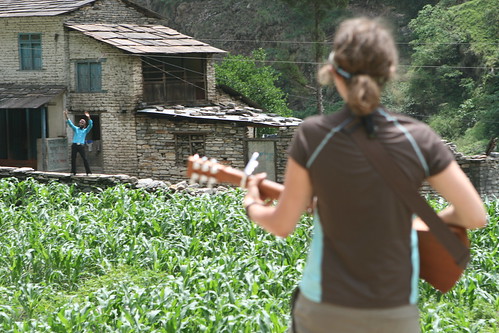Opening the book on our adventures in the Dolpa (rural Nepal) is as
intimidating as the 17,000 foot passes we crossed to get there. Just
look at a single page of my notes!
So instead of hesitating any longer, I’m just going to open and type.
Scared, exhausted, breathless, hungry, sore, cold and wet, on
the first week of our pilgrimage in the Dolpa, I woke up early and as
Sangeetha took to her morning ritual of flicking at the beads of water
that accumulated into breaking dams on the low roof of our tiny tent, I
scribbled into my journal the following:

THESE are the adventures of Kavita and Sangeetha in the Dolpa of rural Nepal.
Names, dates, times, heights, distances and places cannot be
confirmed as such numerals and characters have little value when that
to which they are respective does not exist. Let it suffice that such
measures, here, change with the wind, waning moon and a timeless
culture’s mood.
My name is Kavita. Kavita means, “poem” in Hindi. The name was given
to me by a man born a shepherd of the Ladakhi North Indian plateau, at
the summit of a pass in the Himalayas as a gift to crown the acceptance
of the path of adventures that would ultimately lead to this one. On
that same cliff of life crossroads, I, curiously, kicked not one, but
two, copper horseshoes.
Upon finding my first phone, weeks later, I called my best friend
and told her of my decision to follow my open-ended whim in South Asia.
She replied, “then I’m coming too” and so I sent to her, by way of
messenger, the second copper horseshoe.



Fall, winter and spring pass before we find ourselves reunited in
the smooth clay underground room of an attending Tibetan family in a
tiny and ancient village in rural Nepal. My friend is sitting
cross-legged and wide-eyed at the underground world of which she has so
suddenly entered. She keeps trying to bow lower than the dark, wrinkled
man holding a prayer mala (rosary) and chanting mantras (Buddhist prayers) beneath his smile, for whom she has an unnamed source of reverent respect.
I enter the smoke-filled room and Sonam Tashi, our Tibetan ponyman,
looks up with his perennial smile, just as he snaps a set of new
batteries into an aged radio (and only medium of this otherwise
communication-less world).
“SANGEET!” he shouts, as his arms, inflated by enthusiasm, rise into the air.
As I cross the room to my seat on the richly carpeted clay bench, I
do a little line dance in my best impersonation of traditional Tibetan
dance as I have seen it. Our small audience laughs in surprise, claps
to the beat, and, finally, applauds my short act. Finding my seat next
to my friend, she asks of me, “What did Sonam Tashi shout?”
“Sangeet. It’s Hindi and Nepali for, “music.” That’s it! That’s your name! Sangeetha!”
For it was only a day ago that my friend charmed an entire bus of
local passengers waiting on a cliff ledge (for a secret amount of time)
with the guitar she had struggled to bring half way around the globe to
this moment. As she sang and strummed on the muddy step of the bus, a
beautiful Punjabi boy in a pink turban snapped his fingers, gyrated his
hips and thrust his arms about in animated poses of what he claimed to
be his culture’s traditional dance.

The name is perfect, and thus are born the adventures of Kavita and Sangeetha.
